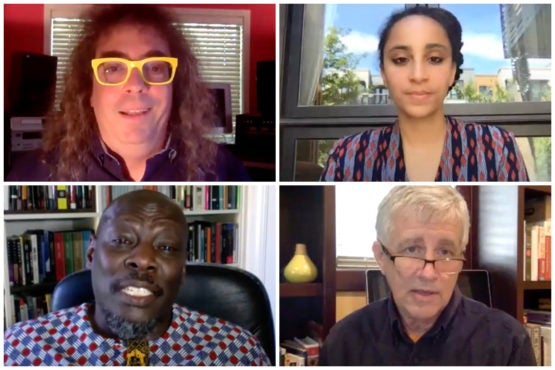Dangerous Ideas lectures now available to Stanford community
Visit ConnectSU to watch videos featuring Stanford faculty who participated in Dangerous Ideas, a course designed to help showcase the relevance of the humanities and arts to contemporary challenges.
Last spring, while many people struggled to make sense of the worldwide troubles, students enrolled in the course Dangerous Ideas learned how the humanities and the arts could help them understand themselves and their world and participate in current debates.

Among the 10 faculty members featured in the Dangerous Ideas lecture course (clockwise from top left): Mark Applebaum, music; Juliana Bidadanure, philosophy; James Campbell, history; and Ato Quayson, English. (Image credit: Andrew Brodhead)
Now, members of the entire Stanford community can benefit from this popular course, which features 10 lectures from faculty members in the School of Humanities and Sciences from a range of disciplines: music, philosophy, art history, English, French, religious studies and history.
“We created the course to show students how these fields – even when speaking about remote eras or distant cultures – can help us make sense of ourselves and our world in the current moment, and bring vital perspectives to contemporary debates,” said Jeff Schwegman, assistant dean of humanities and social sciences, who organized Dangerous Ideas with Lanier Anderson, a professor of philosophy and senior associate dean of the humanities and arts.
“The class felt especially urgent this past spring, when so many of us were searching for ways to process the upheavals in our world and sustain a sense of intellectual community,” Schwegman added. “Many students told me that they shared and discussed our lectures with the people sheltering in place with them. We thought the course might hold similarly broad appeal for our campus community.”
The lectures were recently posted on ConnectSU, a website designed to help faculty, students and staff stay connected to Stanford’s mission and to each other. The videos are available here. (A SUNet ID is required.)
Faculty share vital perspectives
Some of the lectures speak directly to current national issues.
For instance, Juliana Bidadanure, an assistant professor of philosophy, discusses the ethical implications of the Universal Basic Income proposals that are gaining traction as a potential response to the economic consequences of the pandemic.
History Professor Jim Campbell explores the long history of complicity in slavery and racist oppression at many universities as a way of framing current debates about removing statues and monuments.
Other speakers aim, in a more general way, to show students ways of engaging with works of literature and art that can help them make sense of their life experiences.
English Professor Ato Quayson, for instance, takes participants on a tour through philosophical and literary representations of grief and suggests that they provide us with tools to help deal with the pandemic.
Marci Kwon, an assistant professor of art history, teaches students how to look more carefully at the images that surround us in our lives and to question the ways they contribute to efforts to make marginalized populations invisible.
Pick and choose a lecture – or watch them all
The topics and speakers are:
- The University, taught by James T. Campbell, the Edgar E. Robinson Professor in United States History, whose research focuses on African American history and the wider history of the Black Atlantic – the movements of people of African descent from Africa to Europe, the Caribbean and the Americas.
- Migrants and Borders, taught by Ana Raquel Minian, an associate professor of history who studies Latin American migration, and who offers classes on Latinx history, immigration, histories of incarceration and detention, and modern Mexican history.
- Universal Basic Income, taught by Juliana Bidadanure, an assistant professor of philosophy and director of the Basic Income Lab at the Center for Ethics in Society whose interests lie in the intersection of philosophy and public policy.
- Hell, taught by Kathryn Gin Lum, an associate professor of religious studies, who specializes in the history of religion and race in America, and whose teaching and research focus on the lived ramifications of religious beliefs.
- Youth and Old Age, taught by Alexander Nemerov, the Carl and Marilynn Thoma Provostial Professor in the Arts and Humanities, a scholar of American art who writes about the presence of art, the recollection of the past and the importance of the humanities in our lives today.
- Invisibility, taught by Marci Kwon, an assistant professor of art history and scholar of American art whose research and teaching interests include the intersection of fine art and vernacular practice, theories of modernism, cultural exchange between Asia and the Americas, critical race theory, and “folk” and “self-taught” art.
- Creative Agency in the Pandemic World, taught by Mark Applebaum, professor of music and a composer whose solo, chamber, choral, orchestral, operatic and electroacoustic work has been performed throughout North and South America, Europe, Africa, Australia and Asia.
- Grief, taught by Ato Quayson, a professor of English whose research interests include African and postcolonial literature, Greek, Shakespearean and cross-cultural comparisons of tragedy, and diaspora and transnational studies.
- The Decline and Fall of Nations? taught by Caroline Winterer, the William Robertson Coe Professor of History and American Studies, an American historian who specializes in the era before 1900, especially the history of ideas, political theory and the history of science.
- Revolution, taught by Dan Edelstein, the William H. Bonsall Professor of French, whose work focuses mainly on 18th-century France, with research interests in literature, history, political thought and digital humanities.
For more information on Dangerous Ideas, visit ConnectSU.
